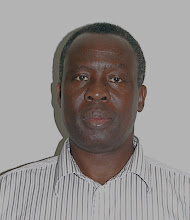Kibaki was never prepared for a second tern in office. He said that he was only going to run one time. Whether this was a bait so that he could be accepted by NARC group or a genuine interest in only serving one term, we can never know. The PNU (Party of National Unity) is certainly a contraption of an active mind bent on staying in the power house, hurriedly put together to enable Kibaki compete a second time. The most interesting show was that of Uhuru Kenyatta abandoning the opposition in order to join the government side. One can only wonder the appeal! Whenever you make this kind of connection, there is danger that one may not honor the agreement. The national character that was embodied by ODM became so troubling that Uhuru Kenyatta was unceremoniously pulled out of the group by clique close to Kibaki. What better message could it be than party of national unity?
Then there was the slogan that a "Luo could not rule" being floated around. There was no politics to go with it. Instead of explaining what they want to accomplice so that the electorate can give them their votes, they (PNU)squandered their chance. Meanwhile ODM was taking it message to all corners of the country. When Raila reached Kibaki's stronghold he was unceremoniously ejected from a hotel belonging to a Kibaki supporter. This was the first glimpse of what could happen in the election. Nowhere else in Kenya did a thing of such magnitude occur, but there were several instances of intolerance. Generally, Kenyans have been patient and watching the going ons but they committed to change through the ballot box. If Kibaki had won "fair and square" without people actually witnessing an open 'rigging,' no one would have resorted to violence. There are reasons why people resort to violence and this election qualified as one. You can put any label on it but it will not change its intensity. It is generally perceived that Kibaki surrounded himself with hardliners and rich people who were able to isolate him from ordinary Kenyans. Other disputes like the memorandum of understanding before beating the Moi government, also have been simmering but the election provided hope that a new administration would usher in better and fair treatment for all. If it was a purely tribal animosity there would be no need to stop momentarily when fairness and wisdom indicate a change in direction. The arrival of the former secretary general of UN, Mr Kofi Anan gave people hope of a resolution of the problem. But as soon as Kibaki again made provocative statement that he was duly elected, violence flared up again and this time it is getting worse because they see that the government of Kibaki is determined to oppress them again for another five years. Evidently preaching politics in the name of tribes alone does nothing but bring in suffering for any group perceived to be allied to the oppressor. Our actions as leaders have far and profound effect on those we lead. There can never be violence where the people feel that they have been treated fairly. Tanzania is a case in point. but even in Tanzania there is a simmering problem between mainland and Zanzibaris.
The history of Kenya is replete with government sponsored killings of opponents. Tom Mboya, Robert Ouko, and J.M. Kariuki were all murdered in the same way by the same group of people in the government. These happened under Kenyatta and also under Moi. Their tribe really did not matter but the fact that they were a threat to the establishment made them all meet the same fate. Tom Mboya was not killed because he was a Luo but because he made a statement in parliament that a clique around Kenyatta was enriching themselves at the expense of ordinary Kenyans. Ouko had easier access to US president than Moi and JM was giving more money at harambee than Kenyatta was doing. People see these actions but have no immediate answer. They absorb it for a long time but never forget it. It gives them clue of the people in power what they can do and how they can be rid off them. That people can so easily label actions in terms of tribes is indicative of a weak system of government prone to corruption.
Now Museveni is angling for a piece of the action in Kenya politic. What better method to assure Kibaki that he would defend him at all cost and that he should not negotiate with 'those killers'? Museveni is also fighting to have Kibaki keep him company of 'democratic dictators.' Museveni also knows that if the people in Kenya succeed in pushing Kibaki out of power, then a similar thing can easily happen in Uganda. That is why he is so far the only leader to congratulate Kibaki on winning the reelection. Then just like in Congo and Sudan, Museveni will send in Uganda troops to 'secure the railway lines.' Just watch and see if Kenya does not resolve the problem through dialogue!
Subscribe to:
Post Comments (Atom)


No comments:
Post a Comment